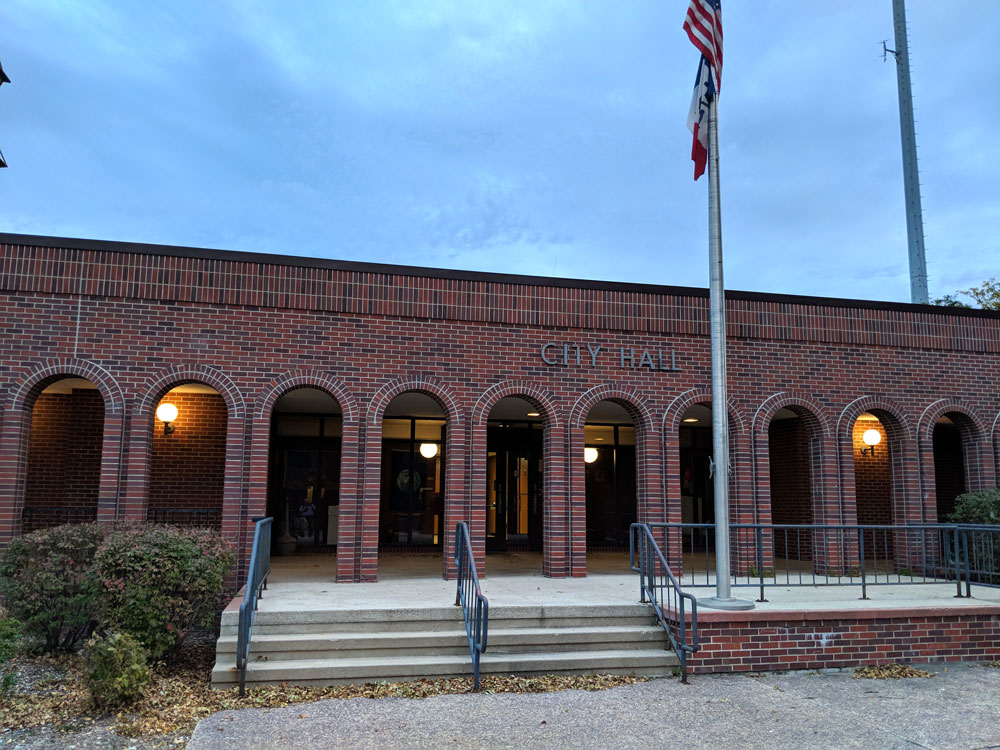State auditor stops in Charles City
By James Grob, jgrob@charlescitypress.com
In Charles City on Tuesday, Iowa State Auditor Rob Sand talked about legislation he’s proposed requiring mandatory prison time for those convicted of misusing public money.
“I think you ought to have felony theft in the state of Iowa result in a prison sentence if it’s taxpayer funds, period,” Sand told a small group of Charles City residents at a town hall meeting at Pizza Ranch Tuesday.
“What you see, time and time again, is people who steal tens of thousands, or hundreds of thousands of dollars won’t spend a day in prison. That’s crazy.”
Sand’s proposal would require mandatory prison time for felonies involving the theft of $1,000 or more in public money, as well as for misusing tax credits. His proposal comes after an investigative story by Cedar Rapids television station KCRG last week found only about 40% of special investigative audit reports dating to January 2017 led to criminal prosecution.
“If you want people to put in the work to prosecute these cases — and they are a lot of work to prosecute — they have to know they’re going to get something that looks like justice on the other end,” Sand said.
“These are the kinds of crimes we can deter. If you have cases where people see real consequences for stealing taxpayer money, that is going to affect the thinking of other people when they decide whether or not to commit that crime.”
Sand was in Charles City as a part of a series of town hall meetings across northeast Iowa. He met with the public in Waukon, Elkader, Oelwein and Manchester on Monday and stopped at Cresco and Osage on Tuesday before the stop at Charles City. He also had stops scheduled for New Hampton and Bremer on Tuesday. He was traveling alone on the tour, with no staffers.
“I think people ought to be given the chance to poke their elected officials with a stick and see what comes out,” Sand said. “It’s helpful for me to talk to folks out and around the state, instead of just in Des Moines.”
Sand, originally from Decorah, was Iowa’s assistant attorney general for seven years before being elected state auditor in 2018.
He said he often worked with the state auditor’s office as he investigated financial crimes as assistant attorney general, and that oftentimes the auditor’s office didn’t have anyone on staff with law enforcement experience, which led to many crimes not getting properly prosecuted. He said he thought if he ran for state auditor he could fix that.
Sand developed a reputation for prosecuting public corruption as assistant attorney general. He prosecuted tax credit fraud related to Iowa’s filmmaking tax credit program and led the nationwide lottery-fixing investigation that uncovered seven fixed lottery tickets across five states with total face values of nearly $25 million.
He said he has also successfully prosecuted attorneys, investment advisors, embezzlers, those who exploit the elderly and violent sexual predators. He prosecuted elected and appointed public officials and employees, and was quick to point out that he prosecuted members of both parties.
He said Tuesday he also saw the auditor’s job as an opportunity to help county and city governments in Iowa better manage their resources.
“The office has the ability to make efficiency recommendations, but it has never done it as a part of its regular work,” he said, and added that he thought as auditor he could find something positive to do for local governments through the state.
He touted his offices Public Innovations and Efficiencies initiative (PIE), which is an effort to promote efficiency in local government. The state auditor’s office provides a list of basic practices for boards of supervisors and city councils to save money, and Sand said he wants the different local entities to share the information.
“If there’s a good idea that you’ve done in your city or county, we want to hear about it,” he said. “We’ll include it in the PIE chart so we can spread it all over the state. I really want it to actually be useful.”
Sand said he makes an effort to keep the office non-partisan and balanced between the accounting side and the investigative side. He hired a chief of staff with a criminal prosecution background, and added two other staff members with backgrounds in law enforcement. He said his leadership team includes one Democrat, one Independent and one Republican.
“It’s not supposed to be a partisan office,” he said. “What ought to matter are the facts and the law; it shouldn’t matter what your party is. You should always be putting the public ahead of the party if you can’t serve them both at the same time.”
Sand took questions and talked at length about Medicaid privatization issues. He said that most people have already decided that the privatization of Medicaid in Iowa has been either 100% good or 100% bad, but he’s not interested in those opinions.
“I’m interested in actually investigating different pieces of what’s going on and trying to figure out the truth,” he said, and added that it was “indisputable that certain populations have a lot of legitimate complaints about the Medicaid system.”
He said his office has opened up a compliance audit to find out if the MCOs are following the rules in their contracts with the state.
“We signed contracts with these MCOs and asked them to run the program on the state’s behalf,” he said. “That contract spells out the minimum expectations. The question is, are we getting what we’re paying for?”
Sand said he’s read the contract, and there are a lot of details in it that could be useful in finding out where the Medicaid system is working and where it isn’t. Sand also said that if the contract itself isn’t worth the paper it’s printed on, it’s a different issue.
“Hopefully, when the audit is finished we’ll have an idea if we’re getting what we’re paying for in the contract,” he said. “We are also taking a look at comparing the contract that the state of Iowa has with the contracts that other states have.”
Sand said that no other state moved to privatization the way Iowa did. Several states have privatized parts of Medicaid, and other states privatized most of Medicaid but phased it in over several years and even decades. He said Iowa made the complete switch in less than six months.
“Gov. Branstad and Gov. Reynolds tried to do it so quickly, that the federal agency that they need permission from to do it said ‘not so fast,’” Sand said. “They slowed down, yet here we are with providers who aren’t getting bills paid, and we privatized every piece of it as opposed to just parts of it.”
Sand, 37, attended and graduated from Brown University, then returned to Iowa to attend the University of Iowa Law School on a full merit scholarship. He and his wife have two young sons.












Social Share